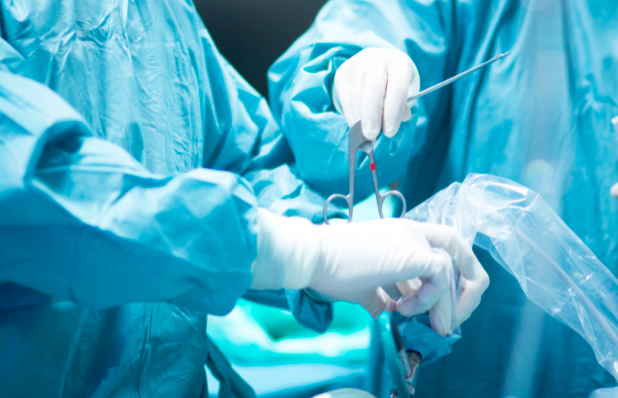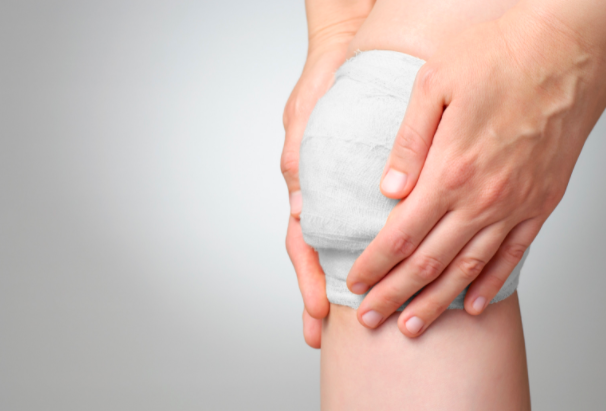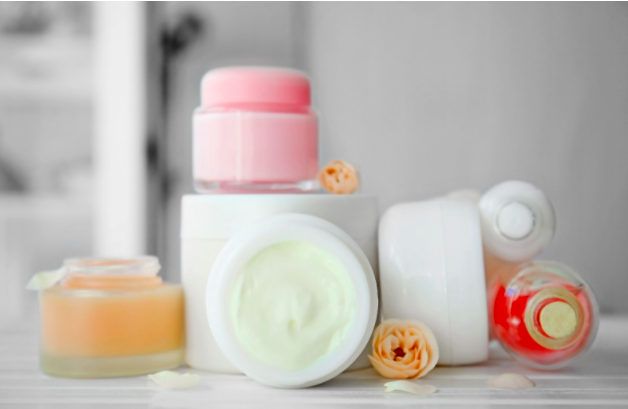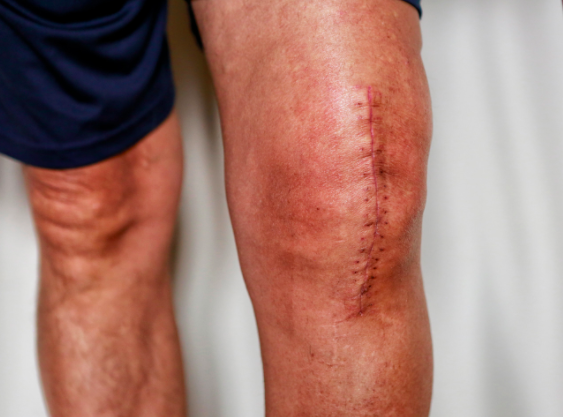You had your ACL surgery and you have less pain, you can now walk around and everything is getting better! BUT there is this really long ugly scar on the front of your knee! Will it ever go away? Is there anything you can do to make it less ugly? This blog aims to answer these questions and gives you the run down when it comes to scar management. Scarring is a visible part of our body’s healing process and unfortunately making a scar completely disappear is nearly impossible. However there are factors that come into play when it comes to improving what the scar looks like after surgery.

Image by Edward Olive Images via Canva - The type of ACL surgery you had can effect the size and severity of your ACL scar
Surgery Type
There are many factors that ultimately affect the size and severity of your scar after surgery. One of these factors being the type of surgery you had. There are 2 major surgical techniques used for ACL reconstruction; open surgery or arthroscopically-assisted repair. [1] There is still quite a bit of debate about which procedure is better, however an open surgery requires a much larger incision. The arthroscopically-assisted procedure is considered minimally invasive and the surgeon only needs to make a small incision on your knee to get to the ACL. [2] In both cases the exact size of the incision will largely depend on the specifics of the reconstruction surgery. If your ACL is being repaired from your own body tissue (another muscle tendon of your own) the surgeon will have to make a much larger cut.[1] On the other hand, ACLs being repaired from donor tissues require smaller cuts. The less disruption there is to the tissue around your knee, the faster and cleaner wound healing is, and the scar from the surgery will be much smaller. We advise having an honest conversation with your surgeon about the functional outcomes of ACL surgery, and advise against making a decision based on the incision or subsequent scar following surgery.

Image by Vonschonertagen Images via Canva - How your ACL scar looks is dependent on how well the incision heals
Wound Healing
While this blog doesn’t go into the specifics of wound care after an ACL surgery, it is important to note the importance it has in terms of the appearance of your scar. How your scar looks is largely dependent on how well the incision heals. Blood supply is a significant factor when it comes to wound healing in different parts of our bodies. [3] Areas of our skin with a rich supply of blood are known to heal with much finer scars.[3] While the front of the knee (area around the knee cap) doesn’t have the best blood supply, the inner and outer regions of the knee joint allow adequate blood supply for most surgical knee incisions. [3] This means that there is enough blood supply coming into the knee promoting good healing of incision based scars. Carefully following instructions regarding infection control and wound management becomes extremely important, especially in the first 2-3 weeks following your surgery.[4] Check out this blog for some great tips on how to care for your wound immediately after ACL surgery.
Constant Monitoring/Observation
The “ideal” scar after an ACL surgery should be thin, flat and begin to match with the colour of the surrounding skin.[4] However, there are instances in which a hypertrophic scar can form. A hypertrophic scar is much thicker and more raised than a regular scar and is considered an abnormal response to wound healing.[4] There is also a genetic component to hypertrophic scars and some people may be more prone to getting them than others. The first 3 months following your surgery is when remodelling of the new tissue hits its peak, this is also the time where hypertrophic scar responses begin to reveal themselves.[3] From 3-6 months after surgery, hypertrophic scars can grow to become more red and painful.[3] Some can diminish on their own, especially around 6 months after surgery but some will require medical intervention. [3] This is why it becomes important to constantly be monitoring your scar, especially during the first few months after surgery. Monthly clinical examinations of scarring is also reasonable and can be quite beneficial for scar management.

Image by Pixelshot Images via Canva - Be critical of the items you purchase when it comes to reducing the appearance of your ACL scar
Creams and Ointments
While the market seems to be filled with creams, ointments and serums that promise to reduce or even remove scarring, the evidence and research behind most of these products is quite poor! Vitamin E based oils and creams seem to be quite popular for the management of scars however reviews have concluded that there are no sufficient benefits in terms of scar reduction. [5] On the other hand, silicone oil-based creams have been proven effective in limiting hypertrophic growth of scars by increasing the hydration and temperature of the local skin to promote proper healing.[3] My recommendation to you is to be critical of the items you purchase when it comes to reducing the appearance of your scars. Existing literature does not support the use of most of the products marketed towards scar healing.
Conclusion
Will my ACL surgery scar ever go away? Well, the honest answer is no. Scars will never completely disappear. With that being said there are definitely steps and decisions that you can make to promote effective healing of your surgical wounds. This can come down to the type of incisions made during the surgery itself, proper wound care, infection control and proactive monitoring and observation. The key here is patience! Scar management is a long-term journey after the completion of your ACL surgery, definitely not something that can be addressed with a quick fix. The Curovate app does a great job of guiding you through your rehab process following surgery. The app will remind you of proper ways to manage your incision wounds, especially in the period directly following your surgery.
 |
 |
|---|
Other Blogs Related to ACL Injury
- Wound Care after Your ACL Surgery
- After I wake up from ACL surgery, what should I expect?
- After ACL surgery, how much help will I need? And help with what?
- Can an ACL injury lead to arthritis in the future?







